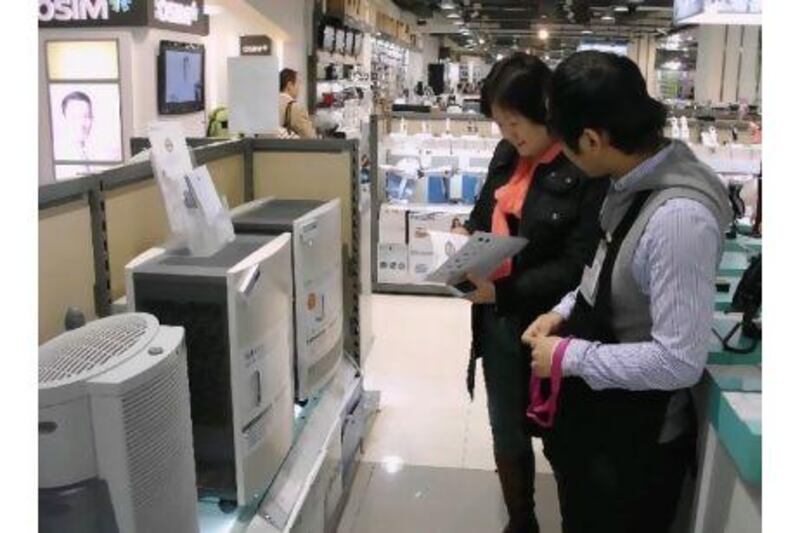BEIJING // When residents of most world capitals gather, they compare flat-screen televisions, schools for their children or real estate. In Beijing, however, talk usually turns to filters and flow rates as expatriates and locals choose air purifiers to combat the pollution.
With hourly online air quality readings from the US embassy regularly rating the capital's air as "hazardous", pollution is a subject never far from people's minds. In Beijing it really matters whether a Blueair or an IQAir purifier gives better results.
Dr Richard Saint Cyr, an American general practitioner who runs the My Health Beijing website, wrote that "Beijing's internet forums are always filled with heated debates as to which air purifier is best".
Half the most popular posts on the blog last year were linked to air pollution, among them articles comparing face masks and the most popular air purifier brands. Distribution companies dealing solely with supplying air purifiers to the capital's residents have been set up.
Awareness among expatriates is "now very high", says Chris Buckley, who has a doctorate in chemistry from Oxford University and runs a Beijing company selling purifiers.
He said the US embassy air quality figures, often much worse than official readings, have been key in making people more anxious. Air pollution in China kills up to 400,000 annually, a World Bank study found.
"The highest level of concern is among parents with children. Rightly so, since there are studies that show that lung development in young children is retarded by high levels of air pollution," he said. Yet some experts believe individuals have little hope of mitigating the effects of pollution.
"There's not that much that people can do," said Wong Tzewai, co-director of the City University of Hong Kong's Centre for Occupational and Environmental Health Studies and a researcher on air pollution. "The [only] idea perhaps is to spend less time outdoors and more time indoors," he said, adding that air purifiers can "help a bit" but "there's no good scientific study to show they do make a difference".
Some can however remove most of the smallest particulates, according to purifier manufacturers and some Beijing consumer studies.
Certainly many people would like to be able to afford them, judging from the outrage earlier this month when it was revealed that a Chinese manufacturer, the Broad Group, has supplied hundreds of air purifiers for buildings used by senior Chinese leaders in Beijing.
"They don't have to eat gutter oil or drink poisoned milk powder and now they're protected from filthy air," one microblogger was reported to have said.
There have been calls for the Chinese authorities to publish data on the concentration in the air of PM2.5s, particles of 2.5 microns or less in diameter, which have the most serious long-term health effects. Yet government pollution readings only consider larger particulates, which the body more easily filters out. Officials have recently said they will allow the public to visit Beijing's air-quality monitoring station.
Tens of thousands of people having recently voted for the release of more rigorous air-quality information, and the authorities have said they will publish PM2.5 data, although no date has been set. Yesterday, state media reported the Chinese Academy for Environmental Planning had set a target of reducing particulate pollution in several parts of the country, including Beijing, by 10 per cent by 2015.
Actually cleaning up the air, rather than merely telling people how polluted it is, is likely to pose larger challenges. "It all depends on the balance of economic progress versus environmental concerns," said Mr Buckley. "The economy here has to deliver a lot of new jobs every year just to keep everyone employed, and social stability is regarded as paramount. With this in mind, it is unlikely that the problem will be solved overnight."
In Hong Kong, which suffers heavy smog, there is "a complete lack of political will" over the problem, according to James Middleton, chairman of the Clear the Air pressure group. "The Hong Kong government always places the tycoons ahead of the state of the air," he said.
A 2010 survey of Hong Kong residents found up to a quarter would consider leaving because of air pollution, sparking fears of a brain drain.
Yet even in Beijing, where the air quality is worse, many are unconcerned. Zhu Jianxing, a 43-year-old who runs a food stall next to Beijing's second ring road, a six-lane motorway regularly clogged with traffic, said he did not worry as he was "in good health".
"And I smoke, so why should I think about the pollution? The only thing is to stay at home. I could do that, but that means I don't earn any money," he said.







